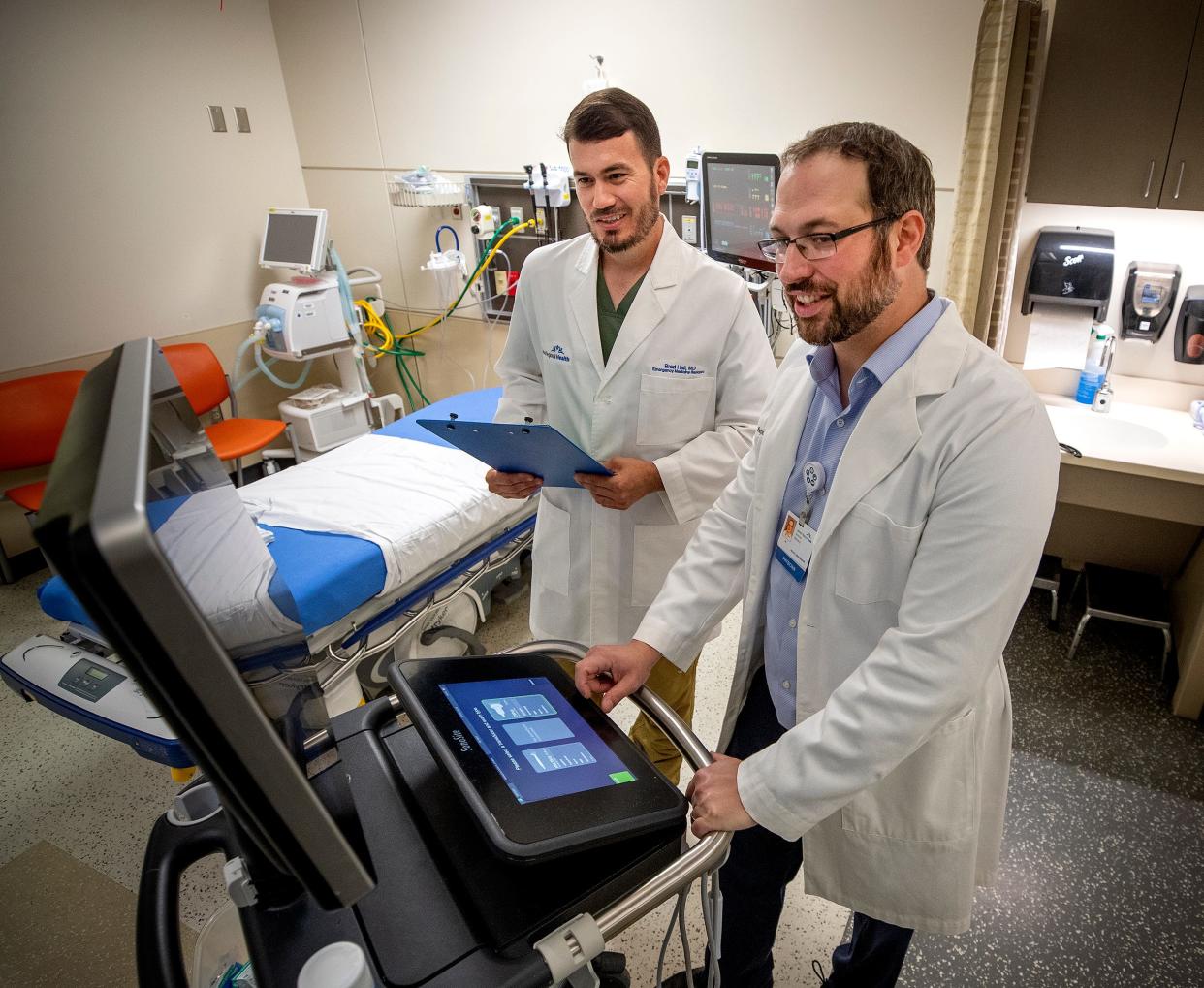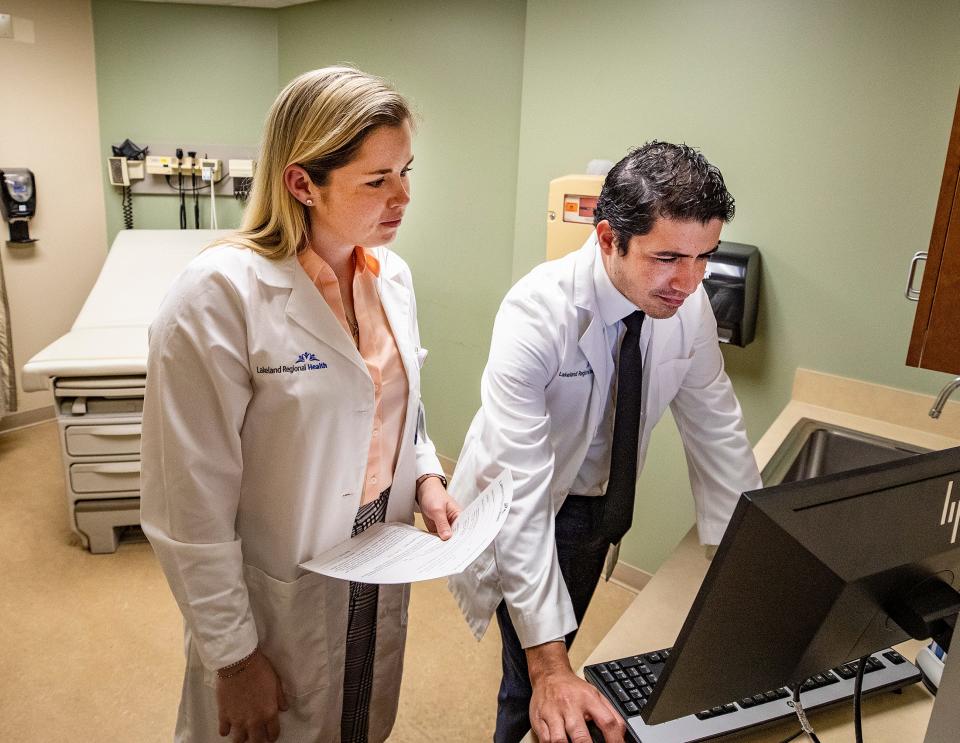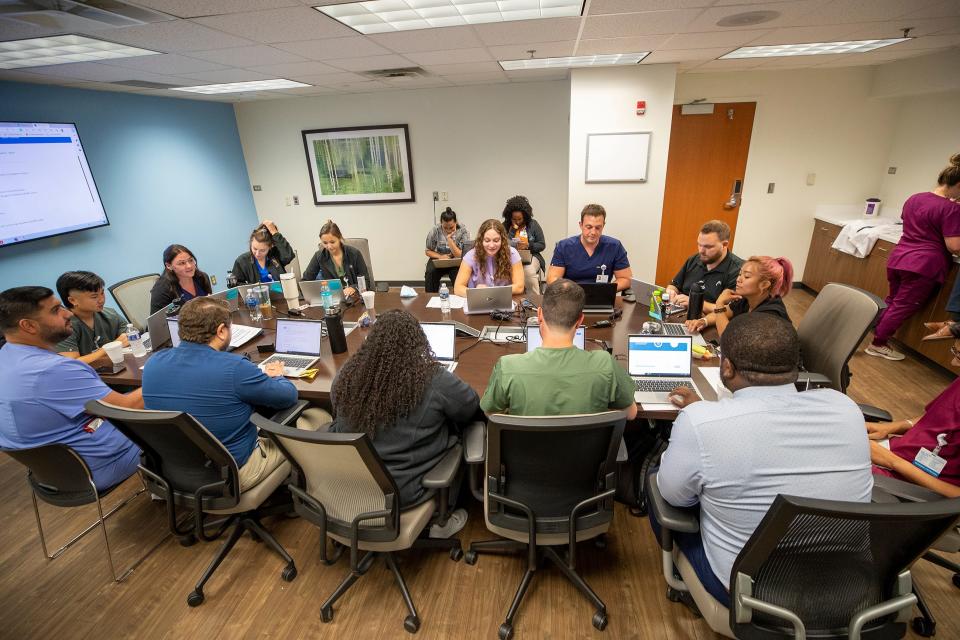Lakeland Regional Health welcomes 70 residents as it becomes teaching hospital

LAKELAND — For 16 years, Brad Hall has worked at Lakeland Regional Health Medical Center as an emergency medicine pharmacist. He resigned only to come back with the title "doctor" as part of the hospital's first class of resident physicians.
Lakeland Regional Health welcomed Hall as one of the 70 inaugural members of its graduate medical education program last week — marking its first days as a teaching hospital. Resident physicians across seven areas began making rounds and treating patients at the medical center Saturday.
"It's been a huge undertaking," said Danielle Drummond, CEO and president of Lakeland Regional Health.
The hospital has been accredited for 187 spots across seven areas: internal medicine, emergency medicine, family medicine, general surgery, psychiatry, transitional year and a critical care fellowship.
Dr. Nancy Finnigan, LRH's designated institutional official for the program, said the residents will work alongside attending physicians, often serving as the first contact with patients. They can be easily identified by a blue name badge that will read "resident physician" as opposed to "physician" for permanent hospital staff. All of the residents' findings will be reviewed by the attending physician with the patients.
Hall, 41, said he's excited to step off the "sidelines" as a pharmacist and learn how to fully care for patients as one of 15 emergency medicine residents.
"I'm looking forward to getting my hands dirty, getting in and taking care of patients," the Mulberry native said. "It's been a long road and process to finally get to be the doctor at the patient's bed."
Getting youth involved Lakeland forms Youth Council, seeks high school students to give input on city priorities
Downtown intersections Lakeland to convert 5 more traffic lights to four-way stops; says crashes are down
Restaurant inspections This Polk restaurant was temporarily closed by inspectors for the 4th time this year
Lakeland Regional becomes a teaching hospital
It was over a decade ago that Lakeland Regional Health began taking steps to launch teaching programs, part of a plan to address several key community health issues.
"We were one of the largest hospitals in the country that was not a teaching hospital and didn't have a residency program," Drummond said. "Starting there, the volume of patients we care for and the complexity of the patients we care for make it an excellent learning environment."
Lakeland Regional Health's primary goal in launching its residency program was to open its doors to the next generation of physicians, Drummond said. In doing so, it hopes to honor its commitment to bettering its care for the community.
"We feel strongly we will be a better organization by having residents in our environment," she said. "The top hospitals in the country are teaching hospitals."
John Hopkins and Mayo Clinic are among the many nonprofit teaching hospitals whose names are widely known.
In becoming a teaching hospital, Lakeland Regional Health will have residents conducting more medical research, investigating improvements and new procedures, as it's required as part of their education. It has launched its first Research Department, which Finnigan said is rapidly growing with interest.
Solving community health needs
Lakeland Regional Health's second major objective in launching a graduate medical education program is to help address a growing concern and gap in local health care.
Polk County is one of the fastest growing counties in the nation for several consecutive years. In 2022, there was a ratio of more than 2,000 residents for each primary care provider available in the county. This can create issues finding an available doctor.
Drummond estimated in her 10 years at Lakeland Regional Health, its staff has grown from about 500 to more than 700 physicians and medical providers. That has barely moved the needle, she said, more or less keeping pace with population growth.
"Having these residents here in our environment will help address some of those access issues during their time in training, as they will be able to see patients in various environments," Drummond said. "We are hopeful they will love it here, like we do, and want to stay here and practice in one of the practices in the community."
Data has suggested medical residents tend to stay in the general area where they train, Drummond said.
"We certainly hope that's the case for us," she said.
Drummond said she hopes the graduate medical education program will create a pipeline of physicians for primary care practices across the county, improving Polk County's quality of health care.
"Nationwide, there's been concerns for many years about whether we have enough physicians to care for the population as we continue to grow," she said.

Who are Lakeland Regional Health's residents?
Despite being a first-year program, Lakeland Regional Health received thousands of applications from medical school students looking to be a part of its fledgling program. Finnigan said she received more than 2,000 applications for internal medicine residents and interviewed over 300 candidates.
St. Petersburg native Emma Weiland, 27, matched with one of 20 available internal medicine spots. Weiland graduated from the University of South Florida in Tampa in May. She completed her clinical studies at Tampa General Hospital before coming to Lakeland.
"I'm excited to be part of a brand new program, brand spanking new," she said. "A lot of residency programs are well established, and there's no passion, no energy."
Weiland said she was impressed that Lakeland Regional Health's process of interviewing and screening candidates was so well organized with detailed schedules and agendas.
"Right off the bat, I was like, 'Wow, this program really had it together'," she recalled.
Roughly 40% of this year's residency class are Florida residents like Hall and Weiland, Finnigan said. There are some individuals coming in who were born in Cuba and Puerto Rico, or as far away as Jordan.
Weiland said she's not at all concerned the first-year program doesn't have a track record when it comes to students passing medical boards. Instead, she views it as an opportunity to be part of something new and an opportunity to get hands on.
Graduate medical resident programs range from a one-year transitional program dealing in broad-based care, to multiyear programs designed for specialties, or five years for those studying general surgery. It's common for a hierarchy to form, Weiland said, where more experienced residents get more opportunities for hands-on experience than first-year residents. She hopes Lakeland will provide a chance to jump right in.
"We are not competing with anyone here other than the attending physicians, who will hopefully take us under their wings and show us this is how you perform the procedure and here's how you do it properly," Weiland said.
The residents have their own space within the medical center that includes conference rooms, study desks, lounge spaces, cafeteria and even a series of suites to catch some sleep while they are on call at the hospital. The space was taken over from the psychiatry department when it moved across campus into the Harrell Family Center for Behavioral Wellness last year.

Lakeland Regional anticipates resident program to expand
Lakeland Regional Health anticipates its residency program could grow in size and scope in the near future.
Drummond said the health care provider is already considering adding some additional fellowships for physicians looking to specialize in areas, for example cardiac care, and adding new areas such as an OB-GYN program that would help support its Carol Jenkins Barnett Pavilion for Women and Children.
Over the next five years, Lakeland Regional Health is fairly confident it will gradually build to having more than 200 residents within its programs, seeing patients at its main Lakeland campus and some of its medical offices.
"I think there's a high degree of excitement on behalf of my team today," Drummond said.
Sara-Megan Walsh can be reached at swalsh@theledger.com or 863-802-7545. Follow on Twitter @SaraWalshFl.
This article originally appeared on The Ledger: Lakeland Regional Health becomes teaching hospital with 70 residents

